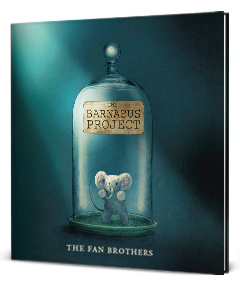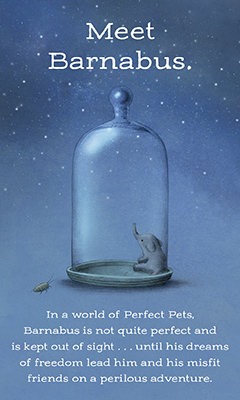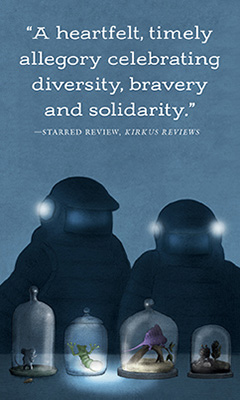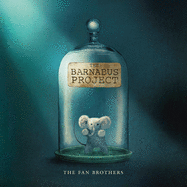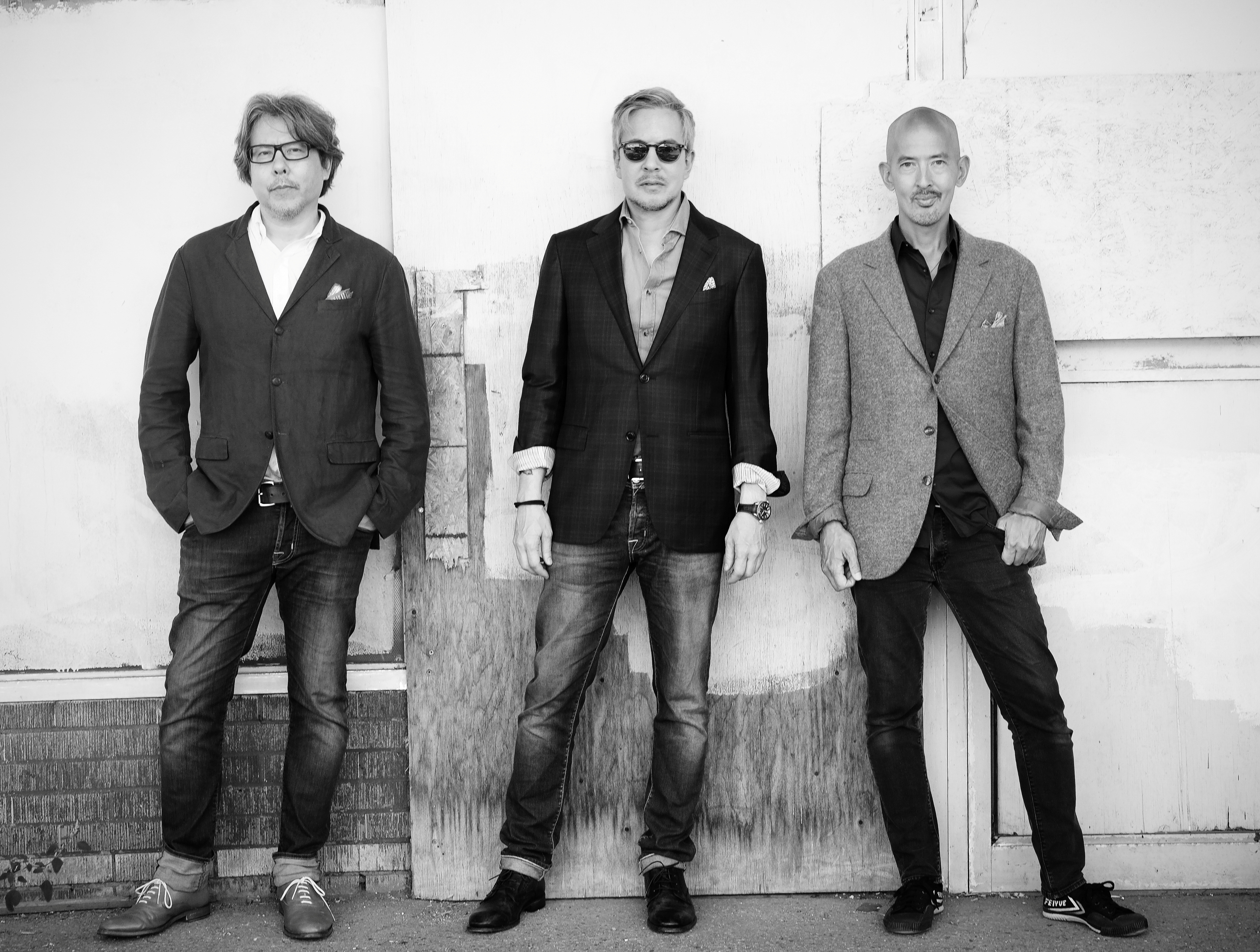The Barnabus Project
by Terry Fan, Eric Fan, Devin Fan
According to half-mouse/half-elephant Barnabus, "Nothing is impossible." In this spectacularly illustrated and remarkably touching picture book by the Fan Brothers (plus one), Barnabus displays the importance of following your dreams no matter what--even when the world sees you as a "Failed Project."
Barnabus and his compatriots--including Bumble Bear, the Bottle Mogs, Lite-Up Lois, Quirt and several others--have been genetically engineered to be perfect pets. Sadly, none of them has made the cut. Barnabus, for one, isn't fluffy enough and his eyes are too small. Sinister-looking engineers known as the Green Rubber Suits keep the creatures in jars ominously stamped FAIL in a lab hidden far below the Perfect Pets Shop. Life isn't too bad in the lab, but Barnabus does sometimes wonder "about the world outside of his little bell jar." His cockroach friend Pip tells the would-be pets what it's like out there, waxing poetic about a "sparkling silver lake, green trees, and mountains that reach... all the way to the sky, lit with their own stars" (i.e., urban high-rises). But it's not until Barnabus learns what happens to failed projects that he decides to take action, and what follows is an adventure to rival all picture-book adventures.
Terry Fan, Eric Fan and Devin Fan bring to light (literally and explosively, as readers will see) an empowering story about the value of finding one's people and working together--appropriately enough, as they are three Canadian brothers who collaborated digitally and on paper to create The Barnabus Project. Terry Fan and Eric Fan, known professionally as the Fan Brothers, have worked together on titles such as The Night Gardener, Ocean Meets Sky (a 2019 Zena Sutherland Award for Children's Literature and shortlisted for the Kate Greenaway Medal), The Antlered Ship (by Dashka Slater) and The Darkest Dark (by astronaut Chris Hadfield). This is their first picture book collaboration with brother Devin.
Their artwork, rendered in graphite and colored digitally, seems animation-ready, its energetic quality giving the distinct impression of motion. In fact, the Fans' quirky characters wouldn't be out of place in a Hayao Miyazaki (My Neighbor Totoro) film. Visual treats are in store on every page for keen-eyed readers, the youngest of whom may enjoy looking for Pip on nearly every spread or seeing how the smaller or less ambulant critters hitch rides with others (like spotted, raspberry-colored Mushroom Sloth, who hangs from a glass thermometer carried by the long-legged Stick One and Stick Two). Even more careful perusal will reveal subtly changing details in recurring scenes, such as the position shifts among the pedestrians on the street, a black cat moving from doorway to sidewalk, and pigeons perched on the rooftop on one spread having taken off to flutter over the building on the next. Certain elaborate settings--the "perfectly ordinary street" of the pet shop, the cross-section of the maze-like underground tunnels, the shelves of bell jars and imperfect pets--are depicted with absorbing detail, inviting repeated returns for new surprises. Adults, too, have much to be entertained by, such as hilariously quotidian details like a man reading a newspaper in what must be the underground staff room (vending machine, water cooler and lockers nearby) that is at the center of the massive lab tunnels. The Fan brothers seem to enjoy taking a sly jab at a world where genetically modified products have become the norm: brilliantly hued and polka-dotted "perfect" pets mingle among more traditional cats and dogs on the street.
Although the book is packed with action and poignance and not a word or picture is wasted, three moments stand out as watersheds. One is when Barnabus blasts apart his jar with a "BWAAHHH!!" from his tiny trunk, setting the failed pets' escape plan in motion. Another is when the gang discovers, on the one vertically oriented page of the book, a monstrously large tank with a single eye peering out of a porthole. The escaping pets, petrified, want to run. But Barnabus stops them. "It's a Failed Project," he says. "Just like us." The next pages are evocative: the group works to free the creature within, led by the sweetly fanged purple octopus-like Wally the Ripple, who wraps his eight legs around the wheel that opens the tank. Meanwhile, Green Rubber Suits approach threateningly from a tunnel. The third watershed is when Barnabus, racing out of the pet shop, pauses to look at an orderly row of the "FULLY TRAINED!" perfect pets in all their fluffy, big-eyed--and packaged--glory. "It was almost like looking in a mirror, except Barnaby's eyes were bigger, and his fur was like cotton candy. He was perfect." But Barnabus continues on to join his friends: "He might not be perfect... But he was free!" By working together to escape the tyranny of perfection, Barnabus discovers the most important thing: He likes himself--and his friends--just the way they are. --Emilie Coulter



